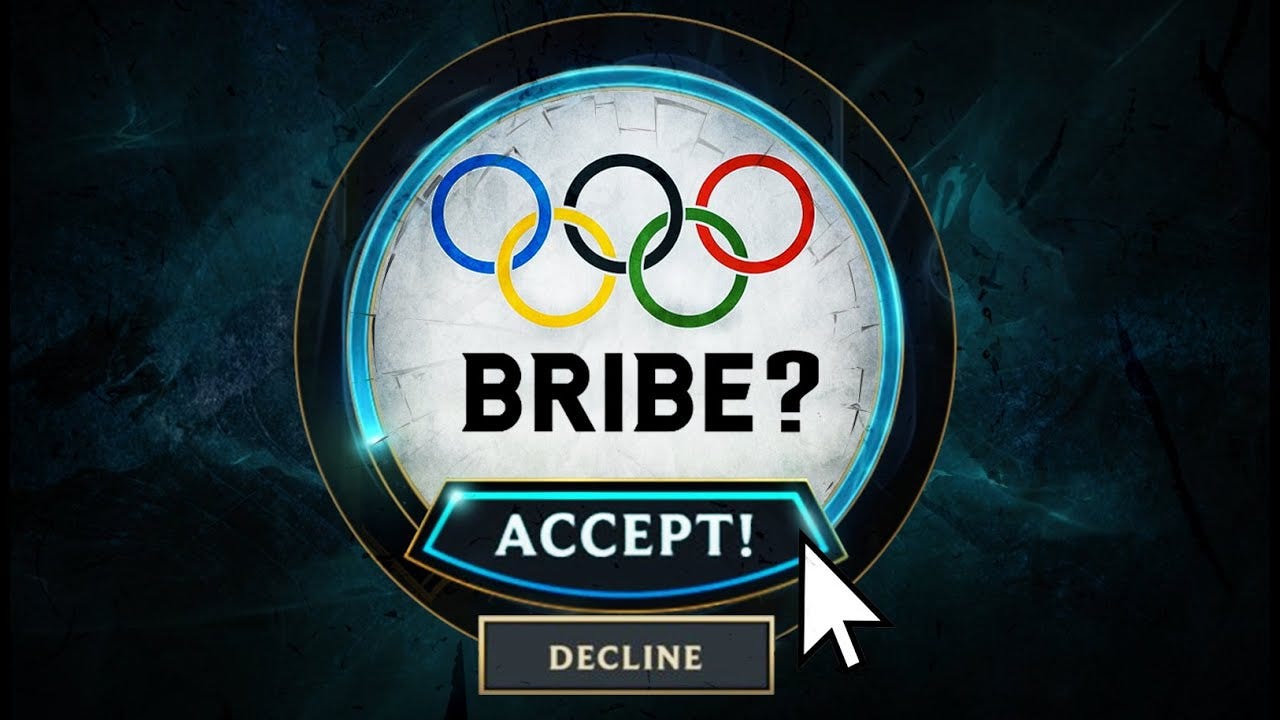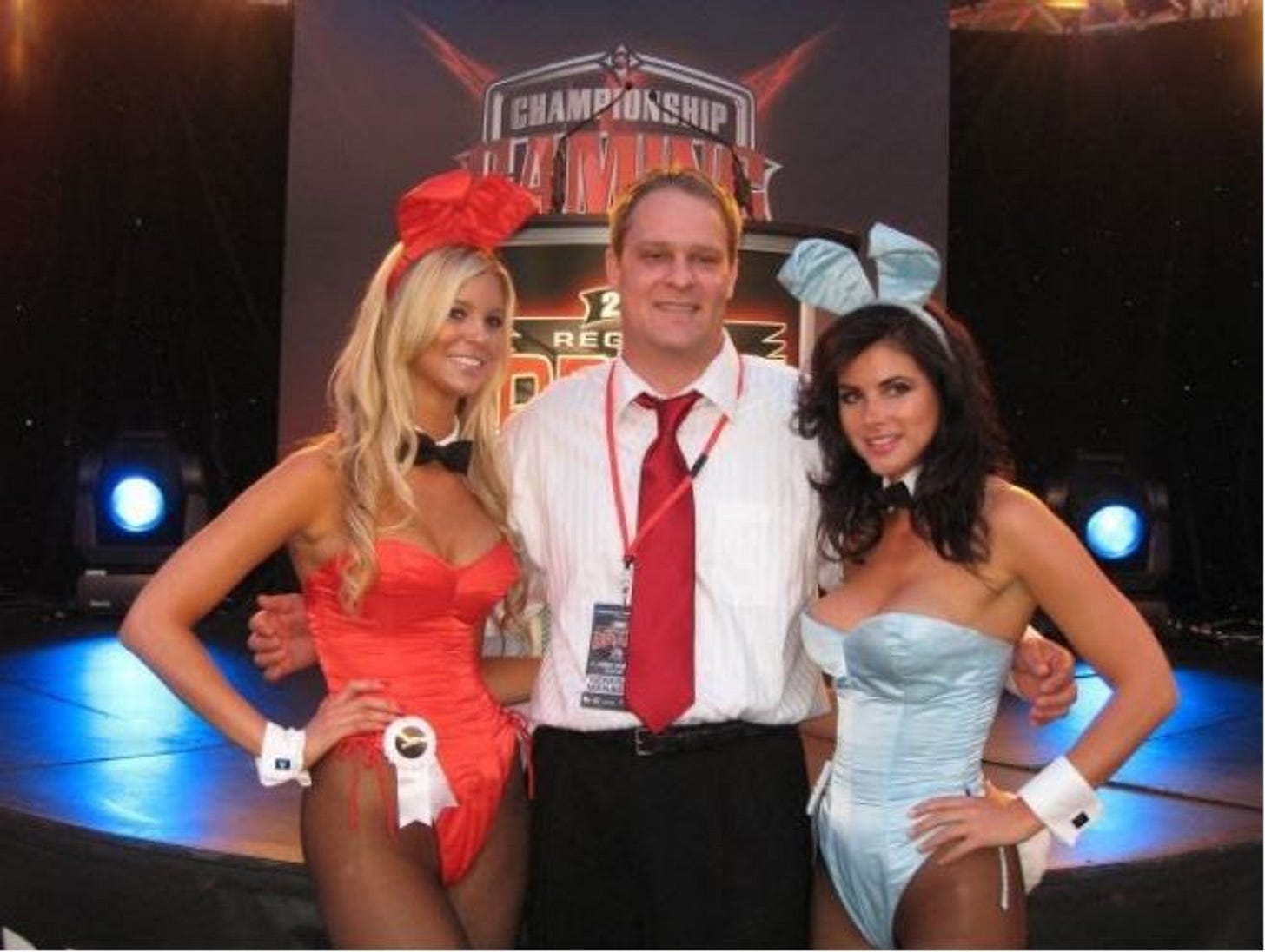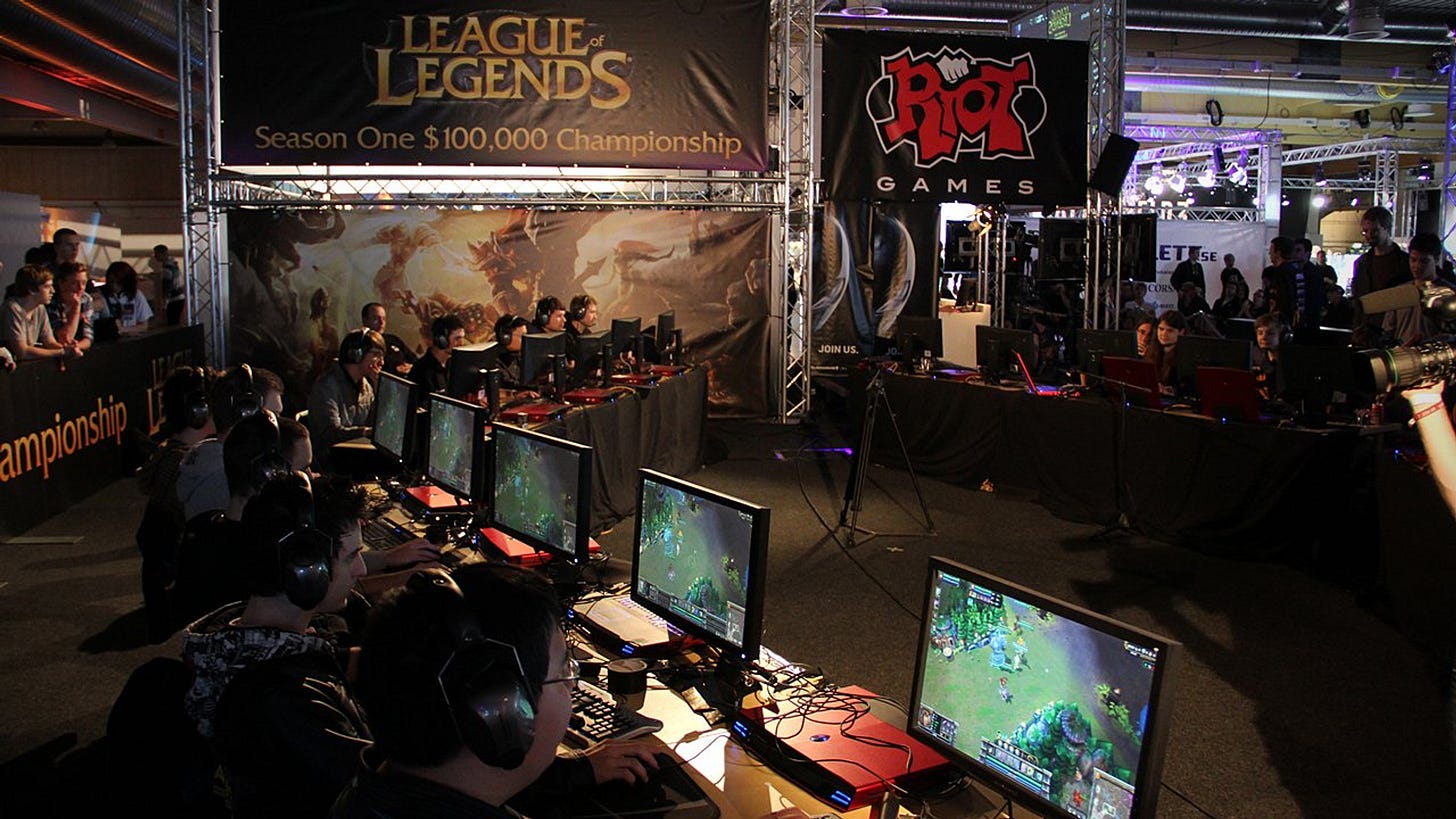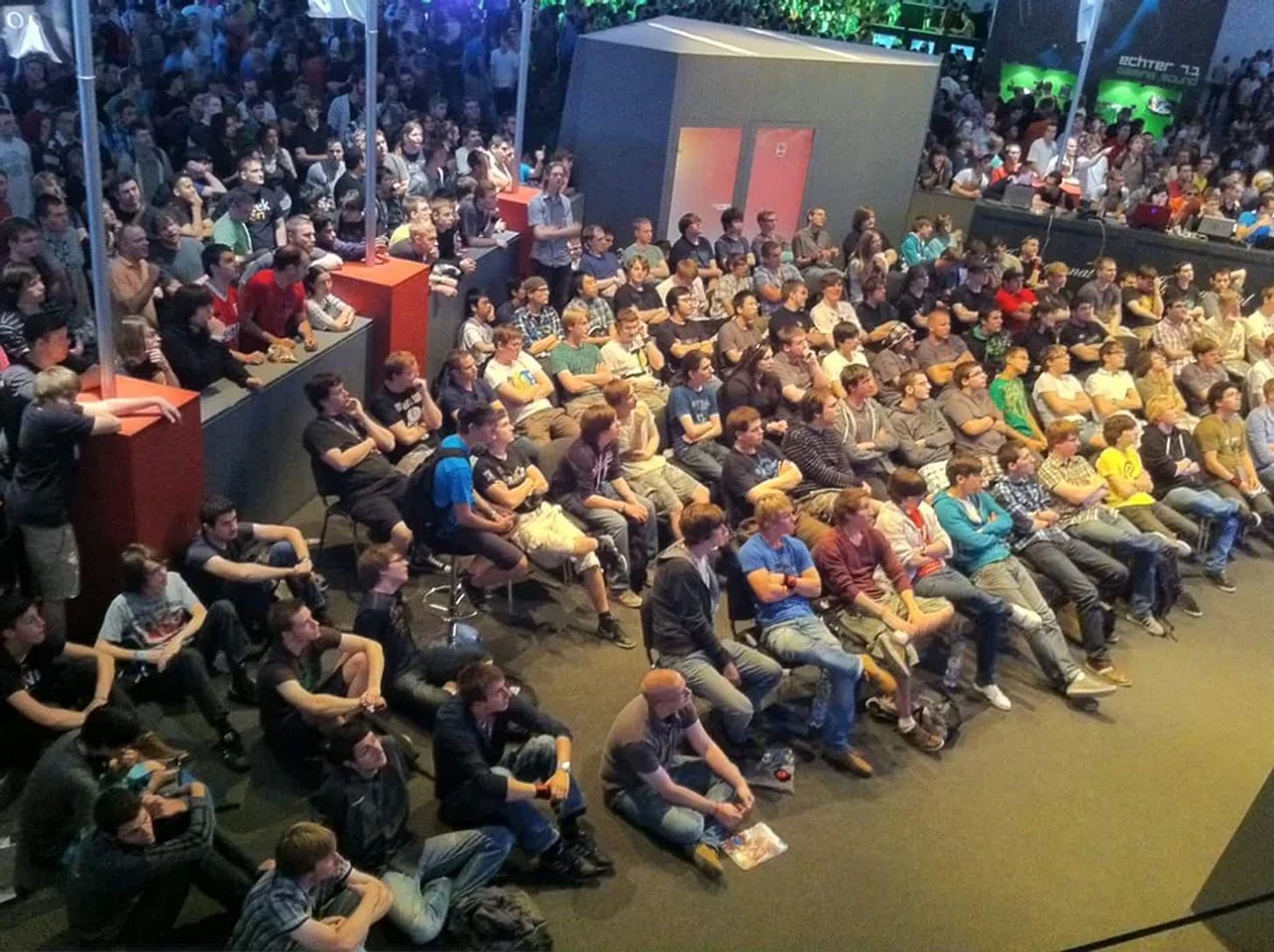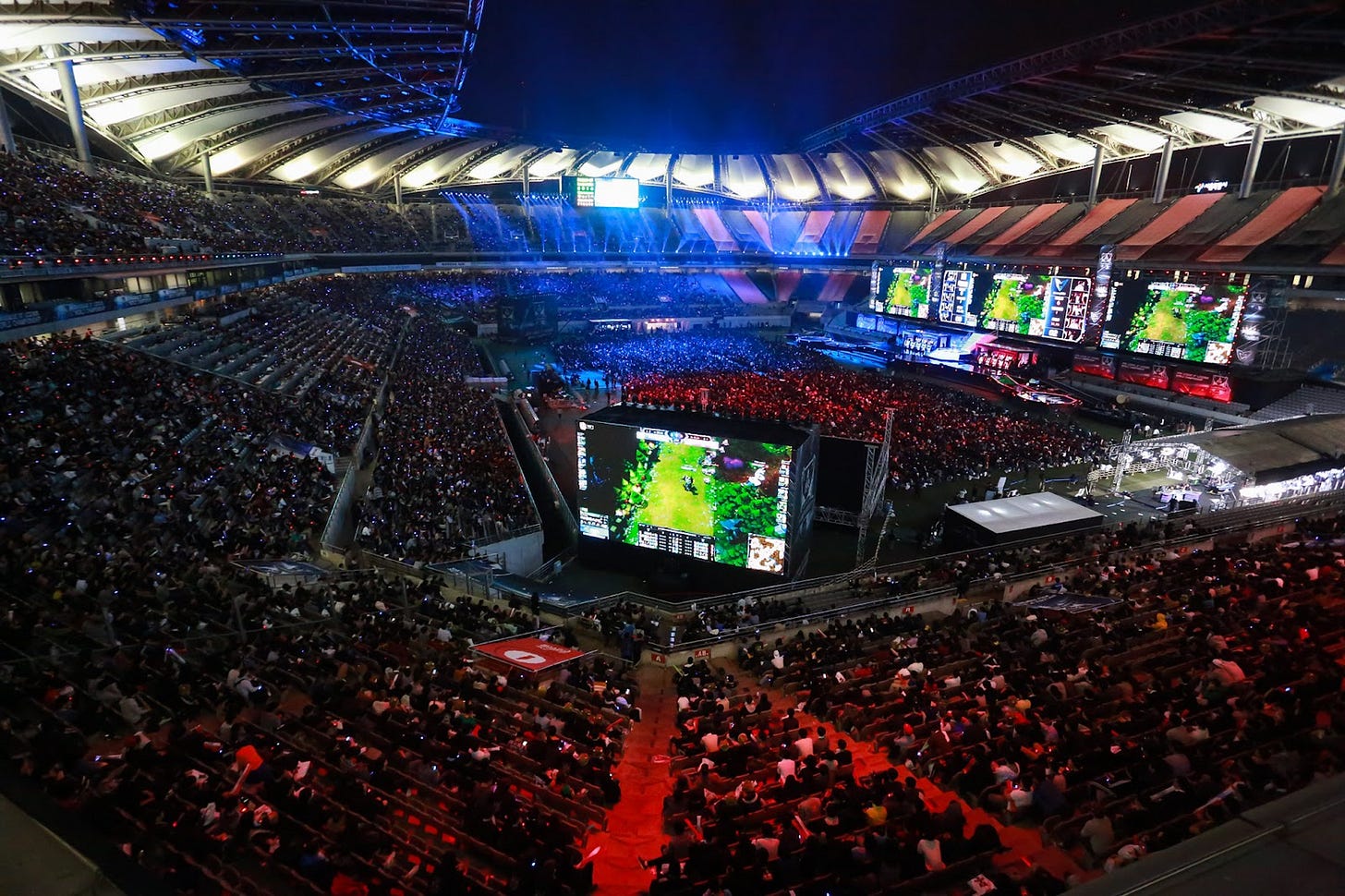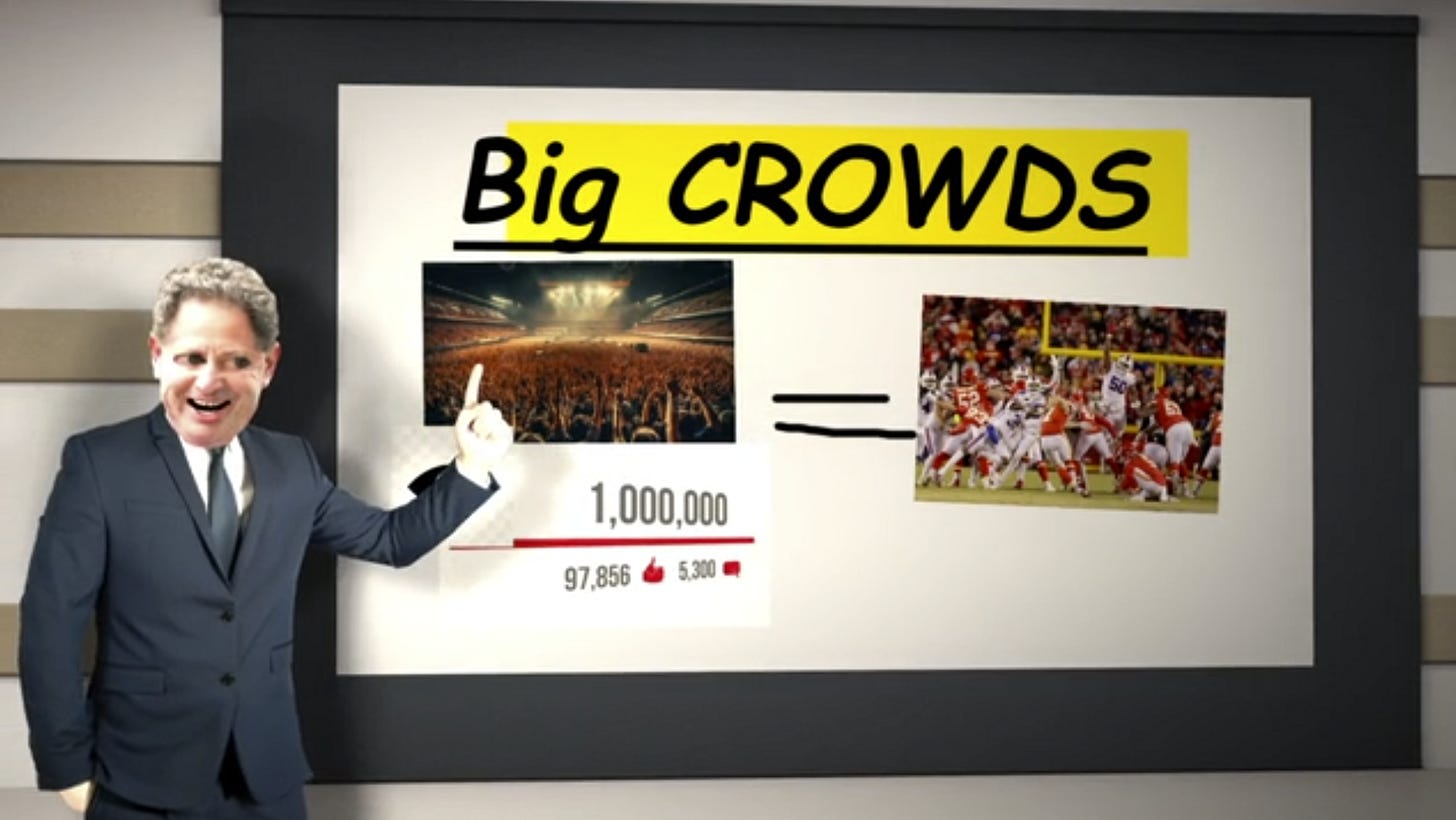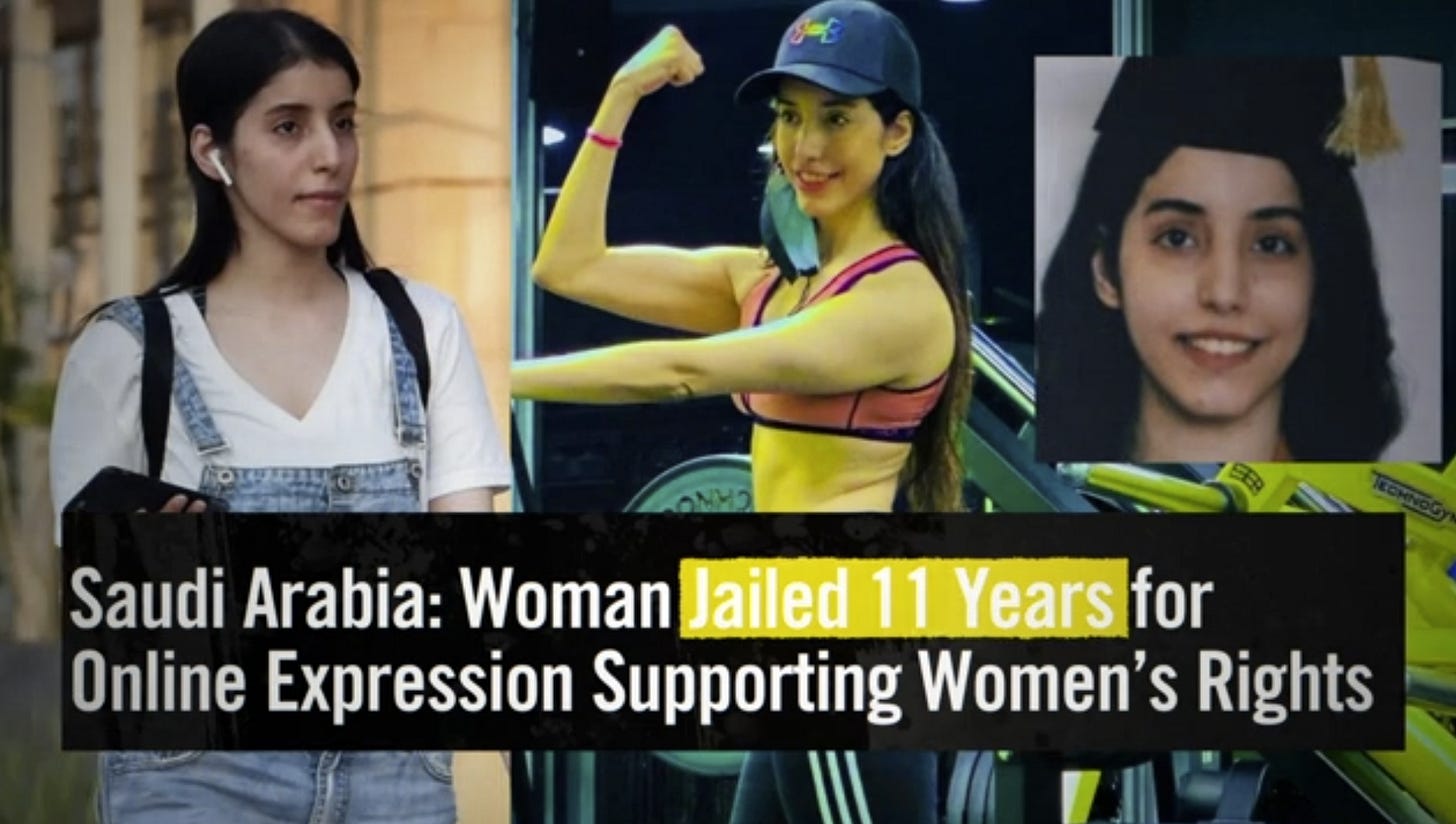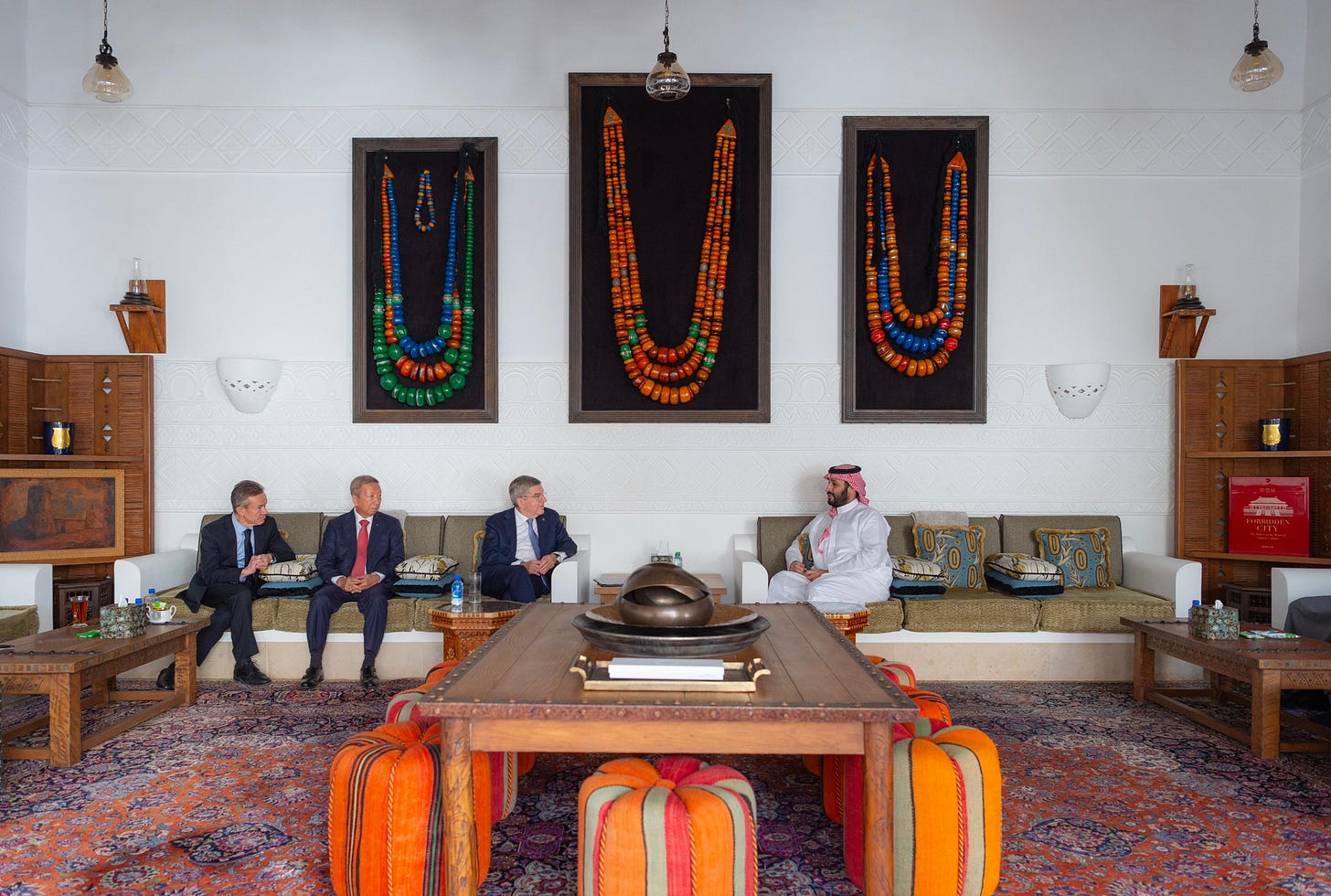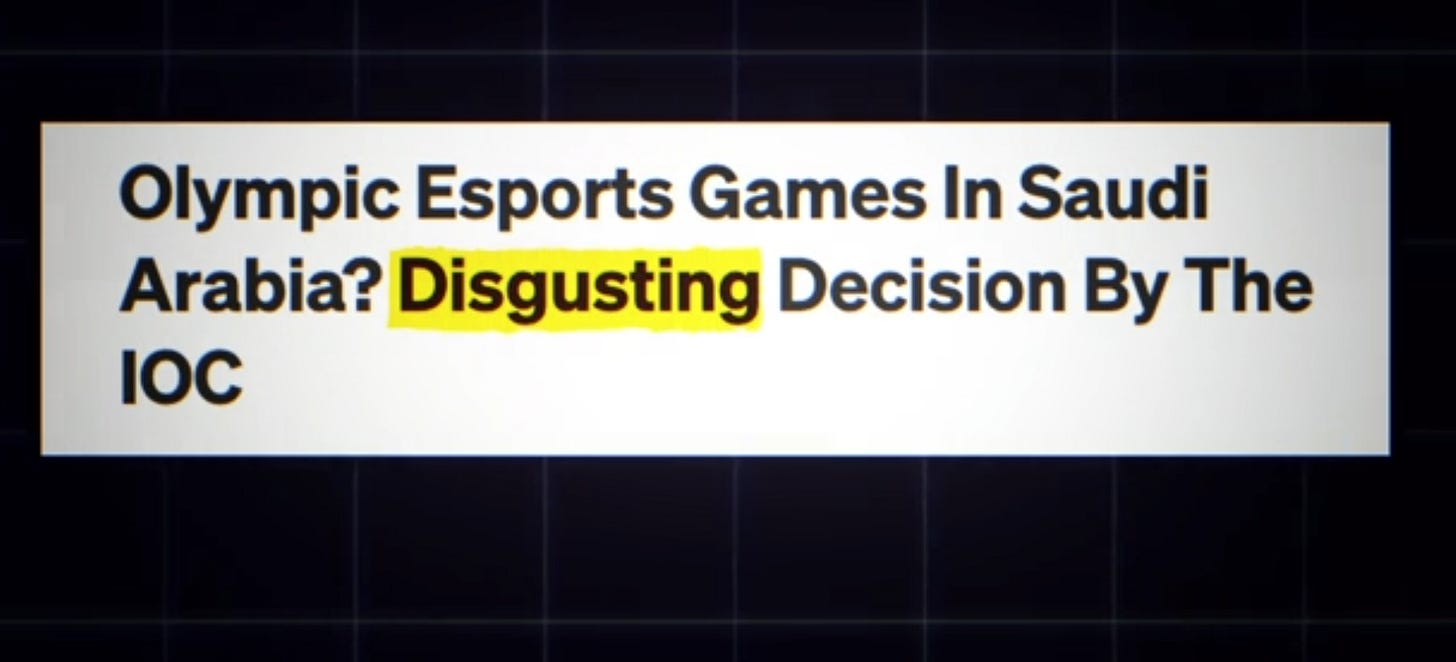How Gaming Forced Its Way Into the Olympics
Through a very oily threesome.
It’s July 2024 and after years of debate, competitive gaming has finally become an Olympic sport.
“You have created the Olympic Esports Games. Congratulations and thank you very much.”
But just 2 years before this glorious moment, esports was almost dead.
From a struggling industry to the most hyped one ever, investors poured in billions, hoping to make some quick money.
But then…the bubble burst, the hype died, and everyone thought it could never come back. The question is: How DID esports manage to come back and become an Olympic sport after all this chaos?
Well, it all started with Britney’s debut in 1998 - ok, maybe not Britney, but with StarCraft’s same-year launch over in South Korea.
High-speed internet and PC bangs turned it into a national obsession. Back then, it wasn't about the money—it was all about the joy of watching others play, whether it was StarCraft, Doom, Quake, or Unreal Tournament.
That's when esports exploded. New esports leagues popped up everwhere, sparking not just massive events, but also one of the best gaming anthems ever.
It was THE GOLDEN AGE of LAN parties. I was blown away to learn that the first massive LAN party, the Gamers Gathering, actually took place in my hometown of Duisburg, Germany!
"Total krass," as we'd say in German.
But something else was “total krass” as well:
In 2007, back when Twitch was just Justin.tv, the Championship Gaming Series hit the scene. It was televised, it had the largest prize pool ever, 50 million views and $50 million in cash. It was so over the top, they even held the draft event at Hugh Hefner's Playboy Mansion.
On paper it was the ultimate payout. But things went south very fast.
The 2008 financial crisis hit, and the league had to shut down.
Teams and talents were left stranded and investors saw “that profitability was too far in the future.” To many, this marked the first setback for the industry and people wondered if esports would ever recover.
But on the other hand, esports made its debut in the Olympics, over in Asia.
The Olympic Council of Asia featured FIFA, NBA and Need for Speed at the 2007 Asian Indoor Games. With millions of views, the International Olympic Committee would soon realize just how big esports would get.
Meanwhile, over in the West, something else was happening: Streaming platforms and live service games. Justin.tv became Twitch - and also the no. 1 game streaming platform. At the same time, Riot Games launched League of Legends and their first World Cup with $100k prize pool. They even sold out famous sporting venues and landed big brand deals.
But it still wasn’t clear if esports was back. On top, many still didn’t see it as a legitimate sport.
To grow, esports needed to amp up its image. And so it did - with Riot launching its second championship series. But this time, not with $100k, but a $2M prize pot. Slowly it became clear: Esports was back and worth watching.
So in just a few years, esports went from this…
to this…
It was the era of the Esports Golden Summer, with rapid investment growth, real business models, training regimes, and even gaming towers and gaming houses.
But - there is always a but - but no one realized they were fueling a huge financial bubble that was about to burst.
In 2016, Activision Blizzard releases Overwatch.
At that year’s BlizzCon, then CEO Bobby Kotick held a private meeting for a few of his billionaire friends from the sports business.
His pitch deck looked something like this:
Big Idea: Launch an Overwatch League, kinda like the NFL but for gaming
Big Money: Ticket sales, merch, sponsorships and hot dogs
Big Crowds: Packed arenas & millions of views, just like in football.
Oh, and let’s not forget: let’s charge a $20 Million franchise fee for each spot
That was the pitch. And the media (I love Emily Chang) was asking if that was for real!
Robert Kraft, owner of the New England Patriots, was one of the first to invest.
“We think this is a solid company, a great company, and we thought this Overwatch is the future…”
Robert Kraft
And this Overwatch seemed to be the future. In 2018, the OWL finally launched as the largest esports event ever, with a traditional sports league model, city-based teams and seasonal playoffs.
And it didn’t take long before another player would join - Saudi Arabia - which invested $3.3B in Activision Blizzard that year.
With all that money pumped into esports, it seemed to be booming. But it wasn’t. The profits didn’t show up.
Investors threw money at it hoping for quick returns but publishers got the numbers wrong…and fudged the truth. They pretended everything was fine, when in fact everything was running at a loss. Showing images of packed stadiums and pushing incorrect headlines just kept investors in the dark. Soon, streaming deals dried up, sponsors walked away, and even some publicly traded esports orgs tanked.
Numbers that couldn’t be fudged anymore. And so came the reports, the angry articles, and even lawsuits accusing the publisher of ”rent-seeking behavior creating economic injury to the league.”
And then, by the end of 2023, the league was officially declared dead. The financial bubble finally popped.
The aftermath? Layoffs across the board and deep disappointment at the publisher - especially with bad bad Bobby.
To many investors, “esports” became a joke, a byword for bad investement. From the Esports Golden Summer it officially became the “Esports Winter.”
All because of too little credibility and too much hubris. Now, with no money and no credibility, how could esports ever recover from this? And, who would step in to save it from dying?
In January 2024, Blizzard dropped some big news: A partnership with the world's leading esports company, ESL FACEIT, to create the Overwatch Championship Series; a rebrand of the old league.
But here is the twist: It meant partnering with Saudi Arabia.
Back in 2021, the kingdom scooped up ESL FACEIT for $1.5B. Their buying spree continued, with stakes in Nintendo, Activision, Capcom, EA, Take-Two and many many more.
It was a clear signal: Saudi Arabia was diversifying beyond its oil-rich economy. From golf to soccer and boxing, their plan to become the crown prince of sports & gaming was inevitable.
And so, in 2022, the Saudi government launched the Gamers8 tournament with a $15M prize pool.
But while the spectacle was going on, serious issues bubbled up nearby
Only 20 miles away, a young woman faced 11 years in prison, a punishment from a secret Saudi tribunal for wearing yoga pants and posting feminist views on Snapchat.
Back in 2019, she talked about "radical changes" in Saudi Arabia, feeling free to express herself thanks to promises from the Crown Prince.
Yet, just a few years later, she was jailed for living those very freedoms.
Esports teams and players were literally disgusted by everything from death penalty over social posts to death penalty even for children.
But some esports teams played along: Team Liquid for instance. They criticized Saudi Arabia's human rights record, but couldn't turn down the cash either. To appease the fans, they announced a $50k donation to charities but made clear why they were still participating:
The community quickly called out their hypocrasy. But hypocrasy wasn’t anything new.
When Riot Games announced a partnership with NEOM, Saudi’s new tourist city, everyone lost it. The community, including a gay commentator, bashed Riot for the deal, especially after Riot had just celebrated Pride Month.
The backlash was so fierce, that within a week, Riot Games ended the NEOM deal.
It was clear. Despite mixed feelings about the Middle East, “the funds are too enticing for esports teams to be turned down.”
And the man with the funds?
Mohammed Bin Salman, also known as Mr. Everything, as he literally controls everything.
He promotes himself as a gamer…
“You’re a big gamer?” - “Since I’m a kid I love it.” - “Really?” - Yes, it disconnects me from reality.”
…and doesn’t care what others think as long as it grows his GDP
“I don’t care, I have 1% growth of GDP from sports, call it whatever you want, we’re gonna get that 1.5%”
MBS
With his involvement, esports recovered. But not without the other key player, the Olympic Committee.
Under Thomas Bach’s leadership, the Committee became more open to esports. But despite the success at the Asian Games and strong arguments for why “Esports should be in the Olympics,” the Committee was still at odds with something:
The “violence” in esports. Which to the president, was crossing a red line:
Thomas Bach, then-president of the IOC
Violence eh? A rather hypocritical standpoint considering the Olympic Committee’s own track record of corruption.
While they preach fair play and respect human rights, they still select host countries notorious for human rights abuses. After choosing China as the host country in 2022, insiders realized that the Olympics are just “easier in dictatorships.”
In a hearing titled “China, Genocide and the Olympics,” the human rights commission criticized the Olympic Committee for continuously selecting corrupt host countries, including China.
But violence or not - the Olympic Committee had a problem: Declining viewership. And so, what they did next would pretty much turn into a joke.
“The first ever Olympic Esports week has officially kicked off in Singapore…
Except, these weren’t our usual esports games. During the Olympic Esports Week, they did try hard, but totally missed the mark.
“So the Esports games are going to be archery, baseball, chess, cycling, dance… “
With the Saudis and the Olympic Committee in the mix, esports started getting some buzz. But with all the chaos, making it a legit Olympic sport still seemed far off.
What it really needed was someone who could fix that—and fix it very quickly.
In 2023, Saudi Arabia then launched the Esports World Cup.
8 weeks of competition, 1500 players and a prize pool of $60M, the biggest in esports history.
The marketing…over the top, filled with dazzling ads and promotions promising the most intense gaming experience. The World Cup turned Riyadh into an “epicentre of esports fandom” and teams celebrated their victories.
But not just teams are celebrating - sponsors were too.
The ones that had backed out during the "Esports Winter" were all crawling back.
Apparently, the “winter was thawing,” so much so that even Riot Games confirmed its participation. At the same time, Saudi Arabia also partnered with the Esports Awards to bring it exclusively to Riyadh.
At this point, the community really went bezerk. Members stepped down and resigned from the panel; others declined working at the World Cup and some even retired from playing in tournaments altogether.
Everyone just slammed the Saudis for being a dystopian monopoly, with corporate malpractice, and that there was no going back now.
British esports journalist Richard Lewis put it very bluntly:
But the sellout wasn’t over. While all this was going on, the Olympic Committee noticed Saudi Arabia’s rise in esports and realized:
(International Olympic Committee)
And so, knowing that esports was hungry for the Olympics and the Olympic Committee was hungry for viewership, the Saudis made a move that would change the game forever:
A historic milestone. For the next 12 years, Saudi Arabia will be the host for the Olympic Esports Games. Which games will be competing, hasn’t been announced yet, but to many, this was already yet another “digusting decision by the Olympic Committee.”
Many stated that it wasn’t esports that needed the Olympics but the other way around. The backlash across channels was yet again, loud and clear.
And so is the hypocrisy. Loud and clear.
It’s tough to see the industry celebrate Pride Months and then cozy up with those who go against everything it stands for.
So what’s next for esports? While the top dogs gloat and young gamers chase dreams of becoming esports athletes, few realize just how fragile the industry still is. With two corrupt powers in control, Esports may have reached the top, but at what cost? Its community spirit, its soul, its authenticity—the very things that made it cool in the first place? I’m not sure. But one thing is for sure: all that glitters is not gold, after all, afterall.


